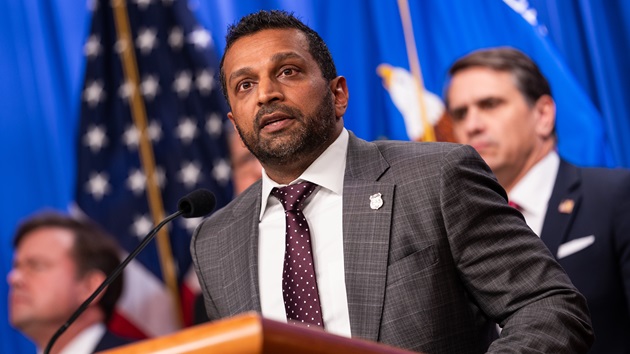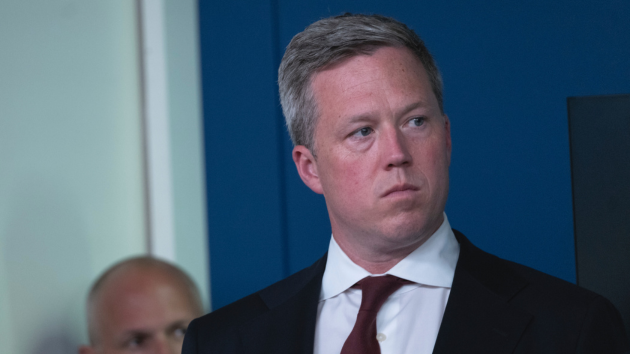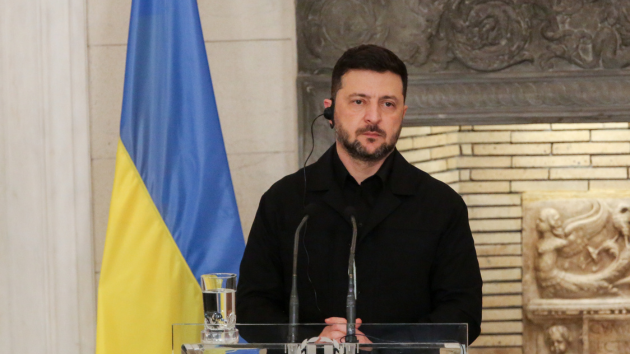Buttigieg visits predominantly Black Alabama community following ABC News investigation about neighborhood flooding
Written by ABC AUDIO ALL RIGHTS RESERVED on April 11, 2024

(SHILOH, Ala.) — An unlikely visitor made his way through rural Alabama last Wednesday to visit the community of Shiloh, a place usually far from the public eye. U.S. Transportation Secretary Pete Buttigieg and two of his top officials came to Shiloh at the request of local landowners who say they’ve experienced frequent flooding ever since the state widened a highway alongside their homes.
Many of the Black families that make up the Shiloh community have owned their land since the end of slavery. Now, as they watch their properties flood, they tell ABC News they fear the generational wealth they’ve built over 150 years will be destroyed by the water.
Pastor Timothy Williams, whose family has lived in Shiloh for generations, has been speaking out about the flooding and damage to his home since 2017, during the highway construction. But until last week, Williams said he did not feel heard by those in power.
“It feels promising just to be able to reach the top of the DOT and for them to listen,” Williams told ABC News on the eve of the visit. “I believe help is on the way.”
Buttigieg’s visit followed an ABC News investigation last October and a meeting between Shiloh residents and officials in Washington last month. It came amid a civil rights investigation, too – a probe by the Federal Highway Administration into whether the Alabama Department of Transportation discriminated against the predominantly Black Shiloh community.
ALDOT denies any discrimination in the highway widening or its aftermath. The agency maintains that the flooding in Shiloh was not caused by the project and says it has been working with the FHWA “to provide facts about the Highway 84 widening project and the concerns expressed by residents of the Shiloh Community.”
However, the ABC News investigation uncovered electronic diaries that showed ALDOT contractors were aware of the flooding in Shiloh and residents’ complaints as they were expanding the highway.
Last week, the feds got to see the situation on the ground and evaluate it for themselves.
Buttigieg walked on the eroded muddy ground that fills with water when it rains. He saw the cracks in the brick exterior of Williams’ house, which the property’s insurer determined were caused by frequent flooding. He heard from residents who said it took longer for first responders to help them during emergencies because the flooding had prevented firetrucks and ambulances from reaching their homes.
“There’s no way I’m going to forget what I just heard,” Buttigieg said.
‘There’s no more lynchings and hangings. It’s coming after your finances.’
Timothy Williams’ daughter Melissa Williams said she does not feel safe in her family’s home when it rains.
“You’re going to bed, you don’t know if you’re going to wake up the next morning,” she told ABC News.
The water isn’t the only force the Williams family says threatens their life in Shiloh. Since the original ABC News investigation aired in October, Timothy Williams said he’s lost customers at his two businesses, a cleaning service and a restaurant.
“In Alabama, there’s no more lynchings and hangings,” Timothy Williams said, but instead, “they come after your money, your finances, and try to drain it.”
Still, Timothy Williams said, he does not regret speaking up about Shiloh’s plight.
“They want us to shut up,” he said. “When they say shut up, you scream.”
But the state has seemed to listen to some voices more than others, residents said.
When Timothy Williams brought his concerns to ALDOT, he felt the agency tried to silence him: Instead of addressing the flooding, the state signed settlement agreements with Timothy Williams and some of his neighbors, paying them each no more than $5,000 to give up their rights to ever sue for flood damages.
Down the road from Shiloh, a day care center saw unprecedented flooding after the highway widening and had to close. The owners – a white mother-daughter duo – were devastated to lose their family business. In their case, ALDOT bought a portion of their land for $165,000, also preventing them from bringing future claims against the state.
Day care owner Ronda Robinson said she feels for the Shiloh families, “’cause the fight was hard.”
Her mother Peggy Carpenter said the $5,000 some Shiloh residents received was like a drop in the bucket.
“You get tired of fighting,” she added.
Robinson and Carpenter said while they don’t know whether the difference between the deal they got and what was offered to Shiloh homeowners had to do with race, they “don’t put it past” the state.
After years of Shiloh residents advocating for additional help, the nation’s top infrastructure official heard their call.
“He listened to the people,” Timothy Williams said of Buttigieg. “He heard us out and he got involved.”
Buttigieg’s visit came during one of his department’s busiest weeks, following the bridge collapse in Baltimore and disruptions to port operations.
Yet here he was, in a tiny community far from any major population center and unknown to most Americans.
“The experiences of a homeowner here in this Shiloh community matter just as much as anybody else in the wealthiest ZIP code in America,” Buttigieg said. “It is one thing to be on the radar, it is another to actually be seen.”
Journey to Justice Tour
Timothy Williams led the group of officials and residents from house to house, passing a loudspeaker to each Shiloh resident and giving them a chance to share their experiences with the flooding – and this time, to be heard.
Timothy Williams led the crowd across the highway to see the drainage system, which funnels water directly onto Shiloh properties, and to the ditches ALDOT contractors dug to hold the runoff, which frequently overflow into the Williams’ front yard.
On their trek around the neighborhood, the officials saw a water moccasin – one of the snakes and frogs that have become a frequent sight in Shiloh – and a gas pipeline that was moved next to the Williams’ home as part of the highway project.
Together, the community’s experiences formed a narrative of fear, loss and disproportionate burden.
Another prominent member of the tour was Dr. Robert Bullard, an area native and Texas Southern University professor who helped coin the term “environmental justice” and has written 18 books on the topic. He helped bring Shiloh to the national stage after joining forces with Timothy Williams last year. Bullard called the situation “a textbook case” of environmental racism.
“They survived slavery. They survived Jim Crow segregation,” Bullard said of the Shiloh community. “But now they’re fighting a highway, an infrastructure, that is somehow stealing their wealth, their inheritance. That’s not right.”
After the tour, Buttigieg met several Shiloh residents and spoke with them individually. He assured them he would bring their concerns back to Washington.
Addressing the crowd gathered near the Williams’ home, Buttigieg said, “[I] want you to know that not only are you seen, but this is being worked at the highest levels of our department.”
He told the Shiloh residents that none of them are responsible for the flooding and its impacts, and that nobody should have to live with what they are going through right now.
In an exclusive interview following his address, Buttigieg told ABC News Senior National Correspondent Steve Osunsami that his department has “a significant and substantial concern about the impact of the highway on this community and about what members of this community are going through.” He said that concern is why there is an ongoing investigation and “active engagement with the Alabama DOT.”
The road ahead
Although it received a rare visit from top brass, Shiloh is not the only community that is the focus of a FHWA civil rights investigation. The agency’s Office of Civil Rights aims to complete these investigations in 180 days. But the people of Shiloh have been waiting more than three times that long – nearly 600 days without an answer to their claims of discrimination or a solution to their flooding.
In a statement to ABC News, an ALDOT spokesperson wrote that the agency has partnered with an engineering firm to “develop plans for further controlling stormwater runoff from ALDOT’s right of way.”
But in a statement to ABC affiliate WDHN, ALDOT denied any unfair treatment and asserted the agency’s belief that Shiloh property owners had been “adequately compensated for any inconvenience caused by ALDOT’s Highway 84 project.”
ALDOT’s statement to WDHN presented two options the agency plans to offer Shiloh residents: selling their properties to ALDOT or having the agency implement a project to retain additional water.
“The choice will be theirs,” the statement read.
To Timothy Williams, this isn’t a choice at all: To sell his property would be to end a multigenerational legacy of community and wealth building. And he says ALDOT’s previous attempts to retain the runoff have not solved the flooding.
Instead, Timothy Williams wants money to rebuild his family home with better protection from flooding, including a higher foundation on drier ground. He wants to create a house as resilient as his community.
“We’re here for the long haul,” Timothy Williams said. “Whatever it takes, I’m down for it, but we’re not going nowhere.”
For the Shiloh community, some said this struggle is about much more than compensation for an inconvenience.
“When people are fighting a road and the flooding, they’re not just fighting that elevated highway,” Bullard said. “They’re fighting for their inheritance, for their children and their grandchildren and future generations, so that’s why this is an important fight.”
Buttigieg hopes to turn that fight into federal action.
“I want to make sure we take that back and engage our sister agencies to get results,” he said. “People who live here need to be taken care of.”
The Williams family saw last week’s visit as a step in the right direction.
“It still doesn’t fix what we’re going through,” Melissa Williams said, “but it does make it a tad bit better.”
Copyright © 2024, ABC Audio. All rights reserved.





